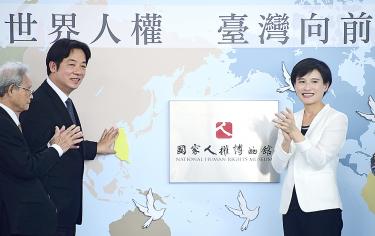A former political prisoner arrested during the Martial Law era praised the establishment of the National Human Rights Museum yesterday as an important milestone in the history of Taiwanese human rights, saying that an honest review of history is the best way to promote social reconciliation.
Chen Chung-tung (陳中統) made the comments at the opening of the museum at Jing-Mei White Terror Memorial Park in New Taipei City, the site of the detention facility where he was imprisoned from 1969 to 1978.
Although some have criticized the Democratic Progressive Party (DPP) government’s promotion of “transitional justice” — saying that it exacerbates social conflict and characterizing it as an attempt to undermine the Chinese Nationalist Party (KMT) as a political force — the 80-year-old said South Korea and Germany are examples of nations seeking reconciliation by coming to terms with history.
“We political victims spent our youth in jail. We can now choose to forgive, but history is about facts that cannot be forgotten,” Chen said.
The Legislative Yuan, in which the DPP holds a majority of seats, passed the Act on Promoting Transitional Justice (促進轉型正義條例) in December last year, which stipulates that a committee be established to detail the history of political repression during the Martial Law era.
Martial law was imposed in 1949 by the then-KMT regime. It was lifted in 1987, but similar restrictions remained in force on Kinmen and Matsu until 1992.
The Martial Law era followed the 228 Incident in 1947, which refers to a brutal crackdown by the KMT government of Chiang Kai-shek (蔣介石) after an anti-government uprising, and was followed by arrests and executions of political dissidents.
The political suppression ended in 1987 and later became known as the White Terror era.
The proposed committee would be entrusted with several goals: making political archives more readily available, removing remnants of Taiwan’s authoritarian past, redressing judicial injustices, producing a report on the history of the period and taking steps to promote transitional justice.
The opening of the museum in New Taipei City came one day after another branch was opened on Green Island off Taitung County. The sites of the two museums were detention facilities during the White Terror era.
Premier William Lai (賴清德) presided over yesterday’s opening, which was also attended by Minister of Culture Cheng Li-chiun (鄭麗君), National Human Rights Museum Director Chen Jun-hung (陳俊宏) and nearly 100 former political prisoners and their families.
Starting next month, the government is to make public 1,038 political archives in the hope of “returning facts to history, turning the land of political trials into a land of reconciliation,” Cheng told the ceremony.
Source: Taipei Times - 2018/05/19





















